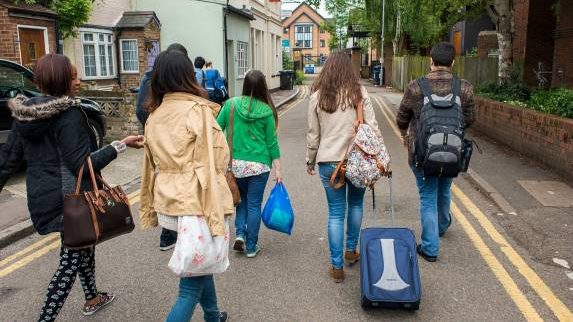Annaliese Oesterlin is a third-year bachelor’s student in fashion design at Kingston University. Whilst the fashion world in the UK is big and promising with fashion brands such as Victoria Beckham, Vivienne Westwood, Burberry and JW Anderson, it is also very hard to get a job or internship in the UK.
“The opportunities in the British fashion industry remain limited”, Oesterlin said. “For fashion students, there are more jobs and more job security in other countries. But Brexit has made that much harder. Moving to Europe, looking for a job there with the new visa requirements that come with it, has made it less appealing to go there.”
Britain’s exit from the European Union (EU) on 31 January 2020, did not only cost a lot of money. It also deprived students of hope and career prospects.
Oesterlin’s classmate, Annabel Noble said: “There’s a lot of uncertainty for students in creative industries. When we graduate, the job market doesn’t look promising.”
Oesterlin applied pre-Brexit for an Erasmus programme and stayed in Amsterdam for a university exchange in 2020-2021. She left the country, however, when she discovered that her study fees had increased by £3000, after the Brexit divorce bill came into force and the majority of the partnerships and perks dissolved. The bill resulted in UK students living in the EU having to pay the same university fees as international students.
The same applies for European students at Kingston University and all UK universities. They pay the international rate, similar to the fees for students from China, India and the United States. The tuition fees for a masters for international students is £6,250 more than for British students. This discrepancy will continue to grow in the upcoming academic year, figures on the Kingston University websites show.
The profile population of Kingston University from December 2016 showed that 5.4 per cent of all KU students came from Europe, whilst more than 80 per cent were home students. In 2020/2021, European students counted for only 3.5 per cent of all KU students.
UCAS data also revealed that applications by EU students in the UK had dropped significantly last year. Applications from EU students (excluding UK students) were 28,400 in 2021 compared to 49,650 in 2020 and 50,650 in 2019.
“When I go to supermarkets, I can see there is a shortage of vegetables and some empty shelves. The petrol shortage was also really distressing last September. Moreover, care-free travelling to the EU has also become more of a hassle,” said Sunnu Rebecca Choi, international MA student in Illustration at KU.
“I am glad the situation is getting better now, but I have seen a lot of my friends going back to their hometowns in Spain because there is more prosperity and job certainty for them there. You either have to apply for British citizenship or have a pre-settlement statement if you wish to work full-time in the UK.”
Turing Scheme
Erasmus students from Kingston University had expressed their discontent in the ending of the Erasmus programme in the UK following Brexit two years ago.
At the end of December 2020, the UK government announced it would make £100 million per year available for 35,000 UK students with an annual household income of £25,000 or less, those in receipt of Universal Credit or care leavers, giving them the opportunity to work or study abroad for a semester.
This so-called Turing Scheme, named after a British scientist Alan Turing, offers funding to both UK and international British Overseas Territories organisations, giving British students the chance to not only go to Europe but all over the world.
The EU has not yet established a programme similar to the Turing Scheme for students wishing to study or work in the UK.
EU Settlement Statement
The EU settlement scheme, that was implemented UK law through the European Union (Withdrawal Agreement) Act 2020, was designed to offer EU, non-EU EEA and Swiss citizens living in the UK before the end of the transition period, and their eligible family members, the opportunity to protect their residence in the UK after the transition period has ended.
If they have settled status, there is no restrictions on where you study or what you study.
Vaiva Roscinaite, second year psychology student at KU, originally from Lithuania but raised in London, had to wait three months before receiving her settlement statement letter, for which she had to pay 65£. Without this confirmation, that she eventually did receive, she would potentially be unable to pursue her studies, as she would be classified as a “non-UK citizen”.
Roscinaite added that her husband’s parents, who are British and voted to Leave, were fooled into thinking that the UK would save money by not letting any more immigrants in. “As someone with a European background, I was mildly offended by their perspective on the latter,” she said.
Promoting a stronger domestic economy and production played another important role in the motivation of Leave voters, according to the Joseph Rownstree foundation.
Brexit has certainly contributed to the cost of living crisis. Advanced economies around the world are dealing with similar problems, though the UK has added disruption from Brexit.
Empty shelves in shops such as Lidl, Wilkinsons and stock shortages in chains such as McDonalds and Prêt à Manger were seen across Kingston.
Ward Danial, second year psychology student at KU and a barista at Pret A Manger, said: “It is really embarrassing. Every day, I have to explain to at least one customer that we have no cocoa powder, no chai lattes and sometimes we don’t even have coffee beans or bin liners in stock. These products really form the basis of a coffee shop.”
Ward said that the Prets in Kingston frequently had to close in the middle of the day because suppliers did not show up. “We then have to tell our customers, who were working or having lunch, to leave the coffee shops to restock our shelves. And it’s not even the shop’s fault, it’s a shortage of suppliers that directly affects us,” he said.
And it doesn’t stop at a shortage of suppliers, meat processors and truck drivers. There is also a shortage of teachers and National Health Services (NHS) staff. The shortages include 39,652 nurses and 8,158 doctors, according to the latest quarterly data for health service vacancies published by NHS Digital.
“Foreign jobseekers may come to UK, but why would they do that there are no visa complications in the country where they are now?” Vaiva added.
Saxon Worboys, second year psychology student, said that Brexit has everything to do with the UK not feeling as “connected and united” to European countries as the European countries feel to each other. The lack of unity and connection is deeply rooted in UK post-war mentality, in which both the Labour and Conservative parties tolerated or encouraged nationalisation, strong trade unions, heavy regulation, high taxes and a generous welfare state.
Saxon added: “It has everything to do with UK alienation from the EU, historical mistrust and a mixture of nationalistic pride and chauvinism. Now, the UK has to take a stance on the new situation and make choices, such as what to do about the Irish-British border and trade agreements with the EU, discussions which are still continuing to take place today.”
An Opinium survey for The Observer found that 42 per cent of people who voted Leave in 2016 had a negative view of how Brexit has turned out.
“Now what we’re seeing is a significant minority of leavers saying that things are going badly or at least worse than they expected. While 59 per cent of remain voters said, “I expected it to go badly and think it has,” only 17% of leave voters said, “I expected it to go well and think it has”, head of political and social research of Opinion Adam Drummond said.
Social media editor and reporter in Kingston, former deputy editor. Work experience at the Islington and Hackney Gazette.






